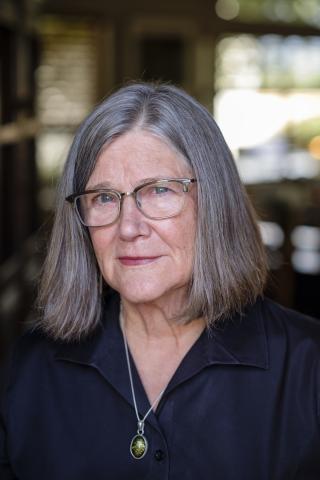
Alison Hawthorne Deming is author of five nonfiction books, including A Woven World: On Fashion, Fishermen, and the Sardine Dress and Zoologies: On Animals and the Human Spirit. Her sixth poetry collection, Blue Flax and Yellow Mustard Flower, comes out is 2025 from Red Hen Press. Her first book, Science and Other Poems, was selected by Gerald Stern for the Walt Whitman Award from the Academy of American Poets. She has edited three anthologies: The Gift of Animals: Poems in Celebration of Animals & The People Who Love Them forthcoming from Storey Press in 2025; Poetry of the American West for Columbia University Press; and, co-edited with Lauret E. Savoy, The Colors of Nature: Culture, Identity, and the Natural World. Her work is anthologized in the Norton Book of Nature Writing and Best American Science and Nature Writing. Deming served as Poet-in-Residence at the Jacksonville Zoo and Gardens in Florida for the Poets House LANGUAGE OF CONSERVATION program and also at Milwaukee Public Museum and Milwaukee Public Library for the Poets House FIELD WORK program. Her awards include the Guggenheim Fellowship, Stegner Fellowship at Stanford University, Fine Arts Work Center Fellowship, two National Endowment for the Arts Fellowships, and Pushcart Prize. Deming is former Agnese Nelms Haury Chair of Environment and Social Justice, former Director of the University of Arizona Poetry Center, and current Regents Professor Emerita at the University of Arizona.
EXCERPT: “ROPE,” published in ROPE (Penguin, 2009)
ROPE
The man gathers rope every summer
off the stone beaches of the North.
There is no sand in this place
where the Labrador Current runs
like an artery through the body of the Atlantic,
channeling particles that once were glacial ice
and now are molecules making
not one promise to anyone.
The man gathers rope with his hands,
both the rope and the hands
worn from use. The rope from hauling
up traps and trawl lines, the hands
from banging into rocks, rusted nails,
fish knives, winch gears, and bark.
The rope starts to pull apart fiber by fiber
like the glacial ice, and the man wishes
he could find a way to bind it
back together the way a cook binds
syrup or sauce with corn starch.
The rope lies in the cellar for years,
coiled, stinking of the sea and the fish
that once lived in the sea and the sweat
of the man who wishes he could save one
strand of the world from unraveling.
